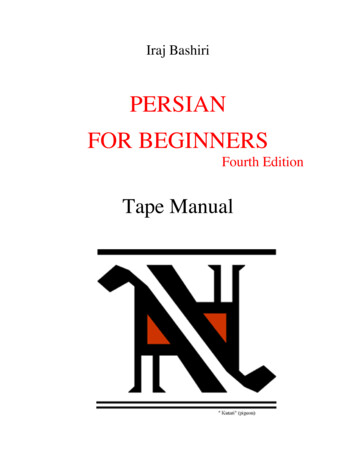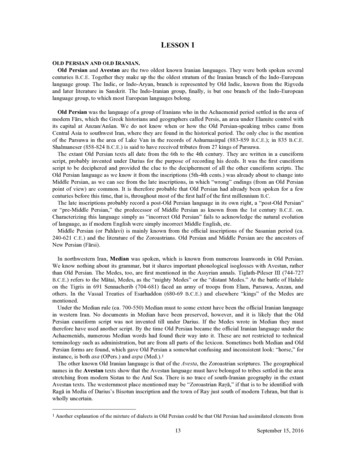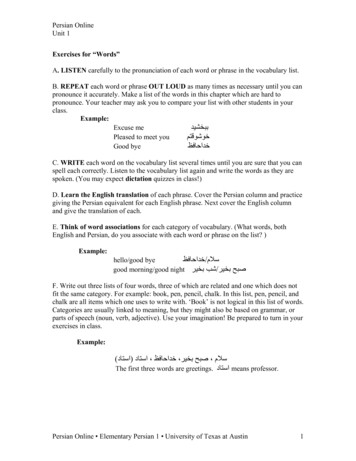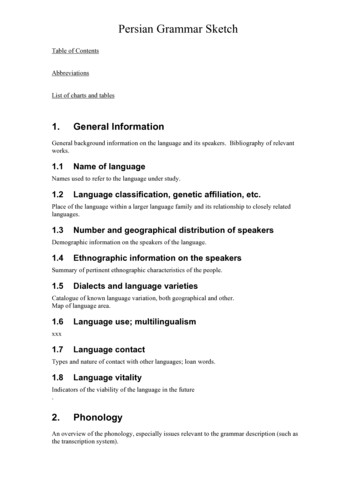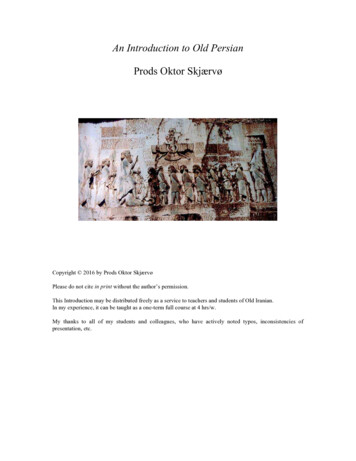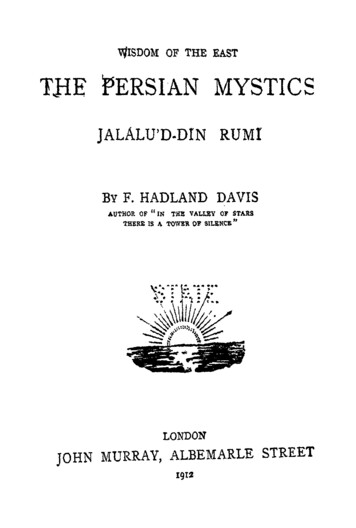
Transcription
ISDOM OF THE EASTTHE PERSIAN MYSTICSJALALU'D-DIN RUM!BYF.HADLAND DAVIS"AUTHOR OF IN THE VALLEY OF STARS"THERE IS A TOWER OP SILENCE"!LONDONSTREETJOHN MURRAY, ALBEMARLE1912
ALL RIGHTS
TOA. T. K.THIS LITTLE BOOK OF EASTERN WISDOMISLOVINGLY INSCRIBED
" OURJOURNEYisTO THE ROSE-GARDEN OF UNIONjALA"LU'D-DfN
PREFACEDESIREto thank Mr. R. A. Nicholson forkind and generous permission to useselections from his Dwani Shamsi Tabriz, andIhisalso his publishers, the Cambridge Press.I amdeeply indebted to Mr. E. H. Whinfield forallowing me to use quotations from his renderingIof the Masnavi (Triibner's Oriental Series).thank Mr. John Hastie for givingpermission to quote a few passages from the""Festival of Springlate Rev. Professor Hastie's(James Maclehose and Sons, Glasgow). Thepoems quoted from this volume are entitled :Rose," "I saw the Winter weaving,""Thy""Love sounds the Music of the Spheres," The"The Beloved All inSouls Love-moved," andAll the other translations from the lyricalAll."poetry of Jalalu'd-Din Rumi are by Mr. R. A.also cordiallymeNicholson.Tothese gentlemen,7andto those
PREFACE8I haveleftunnamed, I tendermy warmest thanksfor their help, sympathy, and interest in"attempt to popularise the wisest of the PersianmyStiffs."F.LONDON,January22, 1907.HADLANBDAVIS.
CONTENTS11INTRODUCTIONI.II.III.IV.V.ORIGIN OF SUFHSM.11.THE EARLY SUFISTHE NATURE OF SUFIISMTHE INFLUENCE OF SUFIISMANALYSIS OF THE RELIGION OF LOVE.14-20.27.31.THE LIFE AND WORK OF JALILU'D-DIN KtiMf 34I.II.III.LIFESHAMSI TABRIZ.3436.THE STORIES OP AL-AFLAKI AND THE DEATHOF JALALU'D-DIN RUM!38THE NATURE AND SIGNIFICANCE OF JALALU'DDIN RUMI'S POETRY40.IV.-.""SELECTIONS FROM THE DIVANI SHAMSI TABRIZ 44SELECTIONS FROM THE "MASNAVI"APPENDIX:A.NOTE ON PERSIAN POETRY.68.101
EDITOBIAL NOTEof this series is a veryobject of the Editorsabove all things that,desireone.definiteTheyin their humble way, these books shall be theTEEambassadors of good-will and understandingbetween East and West the old world ofThought and the new of Action. In this endeavour, and in their own sphere, they are butfollowers of the highest example in the land.They are confident that a deeper knowledge ofthe great ideals and lofty philosophy of Orientalthought may help to a revival of that true spiritof Charity which neither despises nor fears thenation of another creed and colour.L.S.NOBTHBROOK SOCIETY,21,CBOMWBLL ROAD,KENSINGTON, S.W.CRANMEK-BYNGKA. KAPADIA,
INTRODUCTIONI.THE OKIQIN OF SumsMA MONG the Mohammedans Sufiism,JLA-knownor PersianThemysticism,"derivedisfromwool"word Siifi uf, meaningWhen a little Persian sect at the end of theisas tasawmf.century A.D. broke away from theorthodox Muslim religion, and struck out oneighthan independent path, they ignored costly robesand worldly ostentation, and clad themselves ina white wool garment. Hence they were"wool wearers," or Sufis.asEdwardG,Browneknown*gives four theoriesthetoofin regardSufiism, viz.(1) Esooriginteric Doctrine of the Prophet.(2) Reaction ofProf.:theAryan mind against a Semiticreligion.(3)Neo-Pktonist influence. (4) Independent origin.Neither of the four theories altogether satisfiesthe learned professor,*Aand very certainLiterary Hitiory of Persia, vol.ULitis
NEO-PLATONISM12that the last-mentioned theory is of very littleProf. Browne seems in favour of a.""spontaneous growth existing in various forms,under various names throughout the civilisedaccount.all this is not very tangibleMoreover, we must bear in mind thatthe Neo-Platonist philosophers paid a visit tothe Persian court in the sixth century A.D.,and founded a school there in the reign of Nushirwan. It is highly probable, therefore, that theseseven philosophers, forced to leave their homesthrough the tyranny of Justinian, who forbadethe teaching of philosophy at Athens, shouldworld;but afterevidence.have had considerable influence upon a few ofthe more thoughtful Persians,find that this theoryevidence.Let usbrieflyisThe Neo-Platonists believedGoodas the Source of all things.itgeneratedshallnowstudy the tenets of Neo-Platon-ism.fromreflection of itsWeborne out by internalownitself.Being.in theSupremeSelf-existent,CreationwastheNature, therefore,Matter was essenti-was permeated with God.ally non-existent, a temporary and ever-movingshadow for the embodiment of the Divine. TheNeo-Platonists believed that by ecstasy andcontemplation of the All-Good, man would riseto that Source from whence he came.Thesepointsbear directly upon the Sufi teaching.They form a broad outline of the tenets of
NEO-PLATONISM AND STJFIISMSiifiism.TheSufis,13from temperamental andother causes, elaborated these ideas,gave thema rich and beautiful setting, and, what is all-important, built about them one of the mostinteresting phases of mystical poetry the worldhas ever known, and this particular phase maybe said to date from the twelfth century A.D.Thus, I think, it will be readily admitted thatthe Sufis certainly owed something to the Neo-The cry for the Beloved was in theirhearts before the Greek philosophers camebutNeo-Platonism appealed to their Oriental minds.Platonists.;Itwas a stepping-stoneacross the river of theirparticular spiritual tendencies, and they trodthereon, and proceeded to lay down otherstones across the stream. I have pointed outthe similarities between this particular Greekand Persian belief. There was, however, onevery important difference. The Neo-Platonist'sconception of God was purely abstract, the Sufi'sessentially personal, as far as the early Sufiswere concerned. We shall consider other influences which were brought to bear upon Sufiisma little later on. There is a very great differencebetween the early Sufiism and the elaboratethat followed as an evolutionarymatter of course.In brief, then, Neo-Platonism was the doctrineA quotation from the letter ofof Ecstasy.additionsPlotinus to Placcuson Ecstasywill still further
THE EARLY SUFIS14show the similarities between this Greek andPersian teaching"The wise man recognises the idea of theGood within him. This he develops by withdrawal into the Holy Place of his own soul. Hewho does not understand how the soul containsthe Beautiful within itself, seeks to realise:beauty without, by laborious production.Hisaim should rather be to concentrate and simplify,and so to expand his being instead of going out;into the Manifold, to forsake it for the One,and so to float upwards towards the DivineFount of Being whose stream flows withinhim."Tliis isSufiism in prose.same conception intoII.theTheSufis turned thepoetry.THE EARLYSTJFIS.HASHIM (ob. 150 A.H.) was the first to bearname of Sufi, while Dhu'1-Nun-al-Misri(245 A.H.) may be said to have given Sufiism itspermanent shape. Rabi'a, of Basra, was thewoman to join the sect, and her saintlinessand wise sayings have been preserved by Faridu'dDin 'Attar. One day a great sickness fell uponBabi'a, and on being asked the reason for it"she repliedI dwelt upon the joys of Paradiseand therefore my Beloved has chastened me."first:
RABI'A15Rabi'a did not believe in earthly marriage. Her"remark on the subject is given as followsThebonds of wedlock have descended upon me. Iam not my own, but my Lord's, and must not be:to Him." 'Attarwhen Rabi'a was askedinforms usshe hated thelove to God leavesunfaithfulthat"she repliedMyno time to hate him." Rabi'a was adevil,meofalsoif:much independencewomanof thought, ethical ratherthan metaphysical in her remarks, and stronglyopposed to outward ceremonials. She is saidto have died at Jerusalem, 753 A.D. It was atRamla, in Palestine, that a Christian noblemanbuilt a convent (Khangah) for the Sufis.Thusin the early days the sect defied their Prophet'scondemnation of monkery by building an abodeThe Sufis werefor members of the order.strongly opposed to the idea of free-will orand self-existent personality apart fromthe Beloved. The orthodox Muslim's idea wasThe Sufis have alwaysprecisely the reverse.made the Koran their text-book. With infinitedistinctingeniously quote therefrom, andtheir own explanationswhen necessary. No doubt there were politicalreasons for adopting this method of concealingheterodox ideas under the cloak of orthodoxy.shall see, however, as the sect grew andthat thesestill further broadened its views,clever compromises did not prevent the appearlicence theystillWemore ingeniously add
BAYAZ1JJ16ance of martyrs among their number in thefuture.By the end of the second century of the Hijirathe Sufis were a much-respected religious order.In the following century Quietism had not onlychanged to Pantheism, but Pantheism hadkindled a belief that Beloved and lover wereidentical.The step was inevitable and at thiswas that Sufiism became essentiallyandit became more mystical as yearsmystical,advanced. About this time, viz., the beginningof the third century A.H., we come across twointeresting Sufis who seem to have been theprime movers in this new development, by nameBayazid and Mansur al-Hallaj.Concerning the saint Bayazid an interestingstory is told in the Fourth Book of the Masnavi.The saint surprised his disciples one day by"itjunctureThereTheILo,saying:ismyselfno God besideam God Almighty.me worship me "!;thinking their Master was besidehimself, told him, when the strange ecstasy haddisciples,what he hadsaid.Bayazid promptlydo so again straightway slayme " His disciples accordingly sharpened their"knives. Once more Bayazid cried outWithinvestureisbutwhetherGod,mynaughtyou seekHim on earth or heaven." The disciples, horror-passed,replied":IfI!:struck at his remarks, straightway plunged theirknives into Bayazid's body. But their blades
MANSUR AL-HALLAJ17were turned back against their own throats,so that they died.He explained to the fewdisciples, who had not struck him, that theecstasy he had been experiencing annihilated"His form is vanished, he is a mere mirror."self,who hadstruck him saw their ownand so wounded themselves,and not Bayazid, whose soul had left the mirrorof his body and was one with the Beloved.Perhaps the life of Mansur al-Hallaj is evenmore interesting. Whether he was a mereThedisciplesfaces in that mirroradventurer or genuine exponent of Sufiism isopen to controversy among modern Sufis.It will be perfectly safe to describe him as eitherstillsaint or a vagabond.He was possibly bothextremes to suit the necessities of a very excitingand eventful career. He was born in the closeof the ninth century A.D., and was said toperform many miracles, such as raising the deadto life, and drawing gold and flowers from theair.According to his own belief he could writeverses equal to those of the Koran. He went""one better than thesuperman theory, how-aever, and called himself God, and his disciplesAkbar was calledafter the various prophets.God, but deification in this case did not soundhis own trumpet ; it sounded from the"See Akbartrumpet of an enthusiastic poetfrom:and youseeGod."Al-Hallajvisitedfor the purpose of studying magic,Indiaand there
MANSUR AL-HALLAJ18saw the celebrated Rope Trick, on that occasionperformed by a woman, a point of considerableinterest.* This mystic-adventurer wrote fortysix books, and certainly gained considerableinfluence over the lower classes by his manyHe is said to have disputedsigns and wonders.the necessity of making a pilgrimage to Meccaby stating that by occult practices it could beperformed equally well in any room. On acertain occasion, however, we cannot help butadmire Al-Hallafs wit and aptitude. One dayhe stretched forth an empty hand and producedfrom the air an apple, which he asserted he hadplucked from Paradise. One of his witnessesdisputed his assertion, because this particularapple was maggot-eaten, and therefore not of"Divine origin. Al-Hallaj at once repliedItis because it hath come forth from the Mansionof Eternity to the Abode of Decay: therefore to its heart hath corruption found its:way"!Al-Hallaj, on account of his various hereticalteachings, was imprisoned and subjected to allmanner of cruelties. Bravely he went forthto the place of crucifixion. For fourdays henailed on a cross .on both sides of theTigris.From these tortures he was finally released. Tenwasyears later he* "AmongOccult Review,was executed,telling his disciplesthe Adepts and Mystics of Eindostan."December, 1C05.The
TWO EARLY MYSTICS19he would return to them in thirty days, and"Promexultantly reciting poetry, he criedHis own cup He bade me sup, for such is hospi"A comment" of his on Sufiisnfc-a verytalityironical one wasThat which is mine, for:!:by Godnever distinguished for a moment"Yet anotherbetween pleasure and pain"The waycharacteristic saying of his wasto God is two steps one step out of this worldand one step out of the next world, and lo"Whatever wereyou are there with the Lordthe faults of Al-Hallaj, and they were many,at least it may be said of him that he was a braveman. With all his fanaticism, his absurd indisI!::I!cretion and love of conjuring, he left muchbehind of permanent value to the Sufis. TheGovernment, in those days, did all in its powerto restrain the publicity of his books; but alight that was never for a moment set undera bushel cannot be hid; the very attempt toobliterate it is in itself the cause for a keenerand morepersistent search.century of the Hijira we may noteAbu4-Khair as the first to give Sufiism politicIn thefifthand Iman Ghazali as the first toametaphysical basis. At this time wegivefind in Sufi books many terms borrowed fromthe Neo-Platonists. Books on ethics, as wellsignificance,itas poetry,ideas.now became impregnated withSufi
THE NATURE OF SUFIISM20III.Theso thatTHE NATURE OFSTJFIISMare folk who have preferred God to everything,God has preferred them to everything. DHU' L-NUN.*StiffsIK the Islamthere are eight Paradisesthe other in ascending"The .highest is calledThe Garden ofstages.Eden." All are lovely gardens full of luxuriantflowers and trees, amid which gleam the domesand minarets of gorgeous palaces, rich withfaithone withinarranged precious stones, where the departed are feastedand entertained by beautiful houris. All theParadises are watered by rivers, such as theKevser, the Tesnim, and the Selsebil. The greattree grows in theitshighest Paradisebranches fall into the seven othergardens.fThis briefdescription will be sufficient to showthe nature of the Muslim heaven. That it was aTuba;glorified creation of the earth in eightdegrees isevident.physical.1.2.3.was sensuous rather than metaThe five worlds of the Sufis areIt:"The Plane of the AbsoluteThe "Relatively Invisible."The "World of Similitudes."Invisible"* For furtherextracts from Stifi writers see A Historicalthe Origin andDevelopment of Stiflism,f*.t See History of Ottoman Poetry,by E. G. W. Gibb,'vol.i.
THE FIVE PLANES""TheVisible World(or the planeand Corruption")."Form, Generation"5. TheWorld of Man."4.21ofThese Five Planes are often regarded as Three :the "Invisible," the "Intermediate," and the"""VisibleVisible," or yet again as simply the"eeandPlane of theInvisible."Above the"Absolute Invisibleis an infinity which we"might, perhaps, compare with Dante's SpacelessThe Sufis regarded the existenceof the soul as pre-natal. Moreover that the fullperception of Earthly Beauty was the remem-Empyrean."brance of that Supreme Beauty in the Spiritualworld. The body was the veilbut by ecstasy(HAl) the soul could behold the Divine Mysteries.As Avicenna, in his poem on the soul, has written :;Lo, it was hurledMidst the sign-posts and ruined abodes of this desolate world.It weeps, when it thinks of its home and the peace it possessed,With tears welling forth from its eyes without pausing or rest,And with plaintive mourning it broodeth like one bereftO'er such trace of its home as the fourfold winds have left.Creation was regarded as the output of theThe visible world and all thereinwas a reflection of the Divine, an ever-changingscene full of the Spirit of God. The followingAll-Beautiful.beautifulpoemofJami, from Yusuf-u-Zulaykhd,Belovedwill illustrate the Sufi's conception of the
JAMI22and His significance and relationship to Hisworld of lovers :Nomirror to reflect Its loveliness,Its locks ; the morning breezeNe'er stirred Its tresses ; no collyriumLent lustre to Its eyes ; no rosy cheeksNor comb to touchO'ershadowed by dark curls like hyacinth,.Nor peach-like down were there.To Itself it sang of love.In wordless measure.By.Itself it castThe die of love. .One gleam fell from It on the UniverseAnd on the angels, and this single rayDazzled the angels, till their senses whirledLike the revolving sky. In diverse formaEach mirror showed it forth, and everywhereIts praise was chanted in new harmonies.spirits who explore the depthsOf boundless seas, wherein the heavens swimLike some small boat, cried with one mighty voice,""ThePraise to the Lord of all the universe 1His beauty everywhere doth show itself,And through the forms of earthly beauties shines.Obscured as through a veil. .Where'er thou seest a veil,Beneath that veil He hides. Whatever heartDoth yield to love, He charms it. In His loveThe heart hath life. Longing for Him, the soul*Hath.victory.Manwas, therefore, a part of God, because heof the Whole ; or, better still, hewas a fragment* TranslationbyProfessor B. G. Browno.
HAFIZ23was a divine emanation.* The Sufi recognisedthis fact, and his supreme desire was to bereunited with the Beloved. His difficulty, however, was to bear in mind that his worship shouldever be of God, and not of God's many beautifulforms. Love came into his heart, and he endeavoured to recognise that earthly objects,however dear and beautiful they might be,were but lanterns where God's Light shon&through. Here it must be readily admittedthat Sufiism often fails. The Sufi poets weremuchgiven to excessive laudations of physicalbeauty, and we often find, with all the tolerationand ingenuity we can bring to bear, that some ofHafiz's lines are no more spiritual than Anacreon's,to whom he has been compared. We have anumberwords with a strictly Sufi meanwouldnot be wise to strain theinganalogy of earthly love too far and say thateverything that Hafiz wrote was spiritual. TheSufi poets, for the most part, wrote about theLove of God in the terms applied to their beautifulwomen, for the simple reason that no one canwrite the celestial language and be understoodat the same time. Is it to be wondered at that;of Sufibutitthe Sufis, still remembering their old love-songs,their old earthly delights in women dear to them,*Compare the Alexandrian doctrine of Emanations.Also J&mi's Law&i'h. Translated by E. H. Whinfield andMurza Muhammad Kazvmi.
THE MEANING OF SUFI WORDS24should find it difficult not to apply such names,such ideas even in their love of the One Beloved ?Take those expressions literally and many ofthem are sensuous, but consider them as brave,fraught with much spiritualand you at once annihilatetheprejudice and come very near rongstrivings,fervour, after God,Grundy and seek shelter under her hypocriticalsincere Sufiwing when" some really devout and"or sings aboutcalls Godthe Eternal Darlingthe Beloved's curls. In studying Sufiism frompoetry we must always remember thatEastern poetry is essentially erotic in expression,but just as essentially symbolic in meaning.We must also bear in mind and this point musthave had its influence upon Stifiism that theMuslim's reward for having lived a good life,according to the teaching of Mohammed, wasthat he should enjoy an eternal liason withSufilovely touris.may be questioned that if the earthly objectLove was a mere passing shadow of God,the man who loved that object wasequallyAnd again, how can God be theinsignificant.ItofAll-One when, according to the Sufi thesis,divided Himself into creation ?The partis notequal to the whole. These questionsare easily answered. The stars shine in thesky,and on the bosom of the sea without diminution.He
THE VOICE OF LOVE25Let the sea pass away, and the star-shadowsbut the stars are still there.pass away tooSo when the world shall pass away it will only be;innumerableshadows we callbe there, and weshall still be there because we came alone fromHim. There was a Voice that sounded in menand women, in mountains and in seas, in thethefadingHumanity.ofGodwillstillbeasts of the jungle and the swinging of theIt was the Voice of Love, the greatstars.beckoning in the Hereafter to which all thingsmust go. That Voice to the Sufi was God callingHislovers into one chamber, onefeast.Jami has expressed thein the following linesGaze,tillmighty lovefinality of Love:Gazing out of GazingGrew to BEING Her I gaze on,She and I no more, but in OneUndivided Being blended.All that is not One must everSuffer with the Wound of AbsenceAnd whoever in Love's CityEnters, finds but Boom for One,And but in ONENESS Union.;The Rev. Professor W. E. Inge, in ChristianMysticism, has brought a good deal of adversecriticism to bear upon Sufiism. He remarks: "TheSufis, or Mohammedan Mystics, use erotic languagevery freely, and appear, like true Asiastics, tohave attempted to give a sacramental or symbolic
ADVERSE CRITICISM26character to the indulgence of their passions.""writer accuses Emerson ofplayingThe samewith pantheistic Mysticism of the Oriental type,"and goes on to compare him with the PersianSufis on account of his self-deification.Thiscritic, in his desire to defame the Sufis, statesthat they are among the most shocking andblasphemous of the mystics, because they believeis present with them even in theirthat stateearthly life. This, however, is no teaching ofthe Sufis, and, rightly considered, we cannot evenexcept the sayings of Bayazid already referredto, because here he undoubtedly denies all claimhuman personality, admitting God only, /-deification is no teaching of the Sufis. Asthe Buddhist's belief in Nirvana was a stateonlyto be reached bydegrees, after much strivingand severe discipline, so was the fusion of theBeloved and His lover a belief and a beautifulhope far out on the spiritual horizon. HadjtoKhan,in hisinteresting book With the PilgrimsMecca, briefly touches upon this sect and"mentions seven stages in the spiritual growthof the Sufi, and not anarrogant proclamationtoof Deityexistence.and man being coequal in theearthlyThe graduallyscale of theascendinganother point in favour of thisargument. "For the love that thou would'stfind demands the sacrifice of self tothe end thatthe heart m *y be filled with thepassion to standSufi'sheavenis
THE INFLUENCE OF SUFITSM27within the Holy of Holies, in which alone themysteries of the True Beloved can be revealedunto thee." The average Sufi was a poet. Allthat was beautiful was God to him. He triedto be nearer the Beautiful every day, and thushis soul swept on from flower to flower,higherand higher, until he was absorbed into theDivine.We have now seen that Sufiism is essentiallya religion of Love without a creed or dogma.NoHemerciless hells leap up in the Sufi's beliefs.has no one ivay theory for the Life beyond"The ways of God are as the number of the souls:men." There is splendid, magnificent broadmindedness in this Sufi remark. This unsectarian teaching should be applied to everyIt would tend to sweeten and deepenreligion.the thoughts of men, who would forget the pettyofnon-essentials of creedsand dogmas,lost intheperception of the All-Beautiful.IV.THE INFLUENCE OF SUFIISMThis love here forms the centre which expands onsidesand intoall regions.allHEGEL.Jaldlu'd-Din Rumi lived for fiftyyears in a Turkish city he scarcely ever used anyTurkish words ; but nevertheless his influenceon Turkish poetry was very consicUfeble. TheALTHOUGH
INFLUENCE IN TURKEY AND INDIA28Turkish poets of that day poured forth innumer""of a mystical nature.spiritual coupletstheOttoman poets were eitherIndeed nearly allSufis or men who wrote after the manner of thePersian Sufis. Jalal's son, Sultan Valad, wrotein Turkish the following concerning his fatherable:Wot ye well Mevland is of saints the Polo ;Whatsoever thing he sayeth, do in whole.All his words are mercies from the Heavenly KingSuch that blind folks' eyes were opened, did they sing.;TheSufi influenceon Turkish poetry,many yearsafter JalaFs death, gradually weakened as timewent on, and their poetry became less mystical.The French were probably responsiblefor thischange to a certain extent.Then, again, Sufiism influenced the poetryof Indiabut in this case there was influence onboth sides, and the Sufis probably borrowedsome of the Buddhistic ideas, especially in regardto their later conception of Divine absorption.;following remark of Abu Bahu al-Shiblicertainly points to the belief that the Sufisinculcated certain ideas from the Vedanta Philo-The"Tasawwuf is control of the facultiesobservance of the breaths."Sufi poetry has greatly influenced Westernthought. Many of the German mystics wroteas the Sufi poets had written before them. Parsophy:andticularlymight be mentioned Eckhart, Tamer
THE GERMAN MYSTICS29andSuso.Concerning the last mentioned I mayquote the followingpassage to demonstrate my"meaningEarthly friends must needs endureto be distinct and separate from those whombut Thou,fathomless sweetnessthey loveof all true love, meltest into the heart of Thybeloved, and pourest Thyself fully into theessence of his soul, that nothing of Thee remainsoutside, but Thou art joined and united mostlovingly with Thy beloved." There was rapturous language both with the Persian and:;German mystics. The great difference betweenthem was that the German mystics, for the mostpart, were ascetics, the Persians were not. Thenagain in the nineteenth century Hegel was loudin his prais.e of Jalalu'd-Din Rumi, calling hima great thinker as well as a great poet, but somehow he seems to put JalaFs Pantheism first,his Mysticism second.Surely thisthe cart before the horse ?was puttingTo trace the scope of the influence of Sufithought in England would be extremely interesting, but the limits of this little book will notadmit of our doing so. The influence was at firstbut optimistic lovers of theamong the fewEast believe that Oriental thought is dailybecoming of more interest to Western minds.;The student knows that Edward FitzGerald'srendering of Omar Khayydm was anything butafaithfultranslation;that FitzQerald shook
OMAR KHAYYAM30up Omar's wordslike sodice and set themand pessimism. Themanyto the music of wine, roses,Omar Khayyam Club read FitzGerald, but notOmar Khayyam, and in consequence they havefallen into the error of associating Omar withBacchus. But, nevertheless, we must be grate-He has given us a great poem,us hope, many of his countlessreaders to a more faithful study of PersianThe indefatigable Dr. Johnson haspoetry.written the following on the Persian poet,who is the subject of our present volume"He makes plain to the Pilgrim the secrets ofthe Way of Unity, and unveils the Mysteriesof the Path of Eternal Truth/'Concerningour modern poets I have quoted elsewhere afew lines of Mr. Arthur Symons on a dancingdervish.Many of the late Thomas LakeIn Mr.Harris's poems are of a Sufi nature."beautifulpoemMarpessa,"Stephen Phillip'sthe following lines are full of Sufi mysticism :ful to FitzGerald.andstirred, let:For they,Seeking that perfect face beyond the world,Approach in vision earthly semblances,And touch, and at the shadows flee away.is interesting to note that at least one celebrated Englishman adopted the Sufi teaching. Irefer to Sir Richard Burton.* The Sufis believedIt*Life of Sir Bichard Burton.2voli.By ThomasWright.
THE EELIGION OE LOVE31heart and soul in the beautiful lines of Cameons,the poet for whom Burton had so great an affection:Bo what thy manhoodbids thee do, from none butselfexpect applause.He noblest lives and noblest dies who makes and keeps hisself-made laws.All other life is living death, a world where none butAphantoms dwell;breath, a wind, a Bound, a voice, a tinkling of the camelbellV.ANALYSIS OF THE RELIGIOK OF LOVEPut away thetale of love that travellers tellDo thou serve Godwithallthy might.jAiALu'D-Dtsrthe religion of Love.;RUM!LafcadioSUFIISM, then,isHearnin his inimitable way, that earthlytells us,is brought about by the memories of innumerable loves in the past, a host of thephantoms of you seeking in your momentaryego the joy of Love over again. Schopenhauer,with much pride, quotes Rochefoucauld as havingsaid that "love may be compared to a ghostsince it is something we talk about but havenever seen." Precisely but this is no antago-love;nisticasSchopenhauer supposed.Rather than belittling the beauty of Love, it isan unconscious defence of a very great truth.statement,
THE NATURE OF LOVE32Love can only be compared with Love. ThereNo one hasis nothing else to compare it with.Aseen Love, because no one has seen God.little chad plays at funerals and tenderly buriesa dead butterfly, not because it understandsthe mystery of Death, but because Love promptedthe action. And so we love without knowingScientists havethe why and the wherefore.isnot controlledlovefirstthatalready provedthat it iseither of the individuals lovingbut the expression of thousands of tendenciesin past lives. That Love can be ever personal,ever limited to the individual, is unthinkable.We must recognise some day that those countlessby;tendencies, those strivings aftermen and womenwere but theHis creatures. Wedo not love a woman merely because she is pretty,We love herpossesses a pleasing mannerism.because, in an indescribable way, she sings a songwe alone can fully understand, a voice that liftsWe followup our soul and makes it strong.that Invisible Figure from land to land, fromheart to heart, from Death into Life, on and on.When Love loves Love for its own sake, whenthe self is dead, we shall meet Him. We shallfind the Beloved to be the Perfection, the realisation of that strong desire that made us lose ourseeming to hold our souls'momentaryfinding ofselves in others
EDITOBIAL NOTE TEEobject oftheEditors ofthisseries isavery definite one. Theydesire above allthings that, intheir humble way,these books shall bethe ambassadors ofgood-will andunderstanding between East andWest the old world of Thought andthenewofAction. Inthis en- deavour, andintheir ownspher

